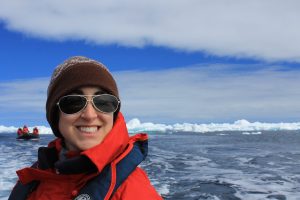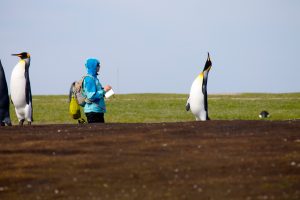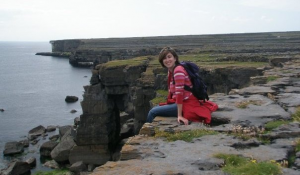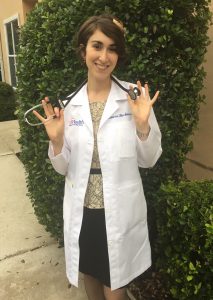Laura (Bochner) Gordon (2010)
I started college with an interest in the sciences. I was thinking of majoring in biology, but I was also open to other areas of study. I discovered geology through the school newspaper. My first year at Lafayette coincided with Professor Kira Lawrence’s first year on the faculty. During my first semester, I read a new faculty profile piece in The Lafayette newspaper in which Professor Lawrence explained her research in paleoclimatology. It sounded so interesting and compelling, especially in light of modern climate change! I signed up for a course with her the following semester – Oceanography. After that, I took Intro to Earth’s Climate with her and was hooked on geology. I loved the culture of the department, the diversity of courses offered, and the unique opportunities for field study and research.

Laura Gordon on a zodiac checking out icebergs and sea ice, Antarctica
By my senior year at Lafayette, I was the proud owner of a collection of flannel shirts, several filled orange field notebooks, a rock hammer, and a wallet-size waterproof geologic time scale. I had done a summer with GeoCorps, spent many hours in Professor Lawrence’s lab analyzing ocean sediment samples, and was considering applying to geoscience graduate programs. My plans were forever changed, however, when my mother was diagnosed with breast cancer around the time of my college graduation. I decided to move home and serve as primary caregiver to my mother and young sister. The year that followed was emotionally difficult but also inspiring, as I took in the professionalism and brilliance of my mother’s care team. As my mother’s cancer treatment drew to a close and I made plans to pursue other opportunities, I began to think about pursuing medicine myself. I was profoundly moved by the positive impact my mother’s cancer care had on my family’s life. I am now a fourth year medical student at the University of Florida. I am planning to pursue radiology as a specialty.
I ended up taking off several years between college and medical school and, during that time, I did a year of AmeriCorps with a land conservation focus and worked as an educator at science museums. I also spent time working for the Environmental Studies program at Lafayette. While doing museum science education, I had the opportunity to spend time aboard the JOIDES Resolution ocean-drilling vessel during one of its short cruises.

Laura observing king penguins on the Falkland Islands
Lafayette offers amazing opportunities for personal and academic growth, and I tried to take advantage of them wherever possible. I was particularly interested in educational travel opportunities!
Geology-related experiences included two interim trips through Lafayette, Geol 150: Geologic Evolution of the Hawaiian Islands and Geol 160: Geology from A (Arches) to Z (Zion): The Geology of National Parks in the Western United States. I also did an interim study abroad trip to Antarctica/Patagonia/the Falkland Islands through Michigan State University.

Exploring the Black Fort Cliffs on Inishmore, one of the Aran Islands, Ireland
I participated in EXCEL undergraduate research in geology with Professor Lawrence and ultimately completed a senior thesis project with her. I had several unique summer experiences, too. I spent one summer as a Geoscience and Public Policy Intern at the American Geosciences Institute in Washington, D.C.. Another summer, I did paleobiology research in Dublin, Ireland, with a program I learned about from Professor Dave Sunderlin. I then spent the following summer in Santa Fe, New Mexico, working as a GeoCorps member on a GIS project for the Bureau of Land Management.
Outside of geology, I participated in Tech Clinic. I lived in the McKelvy House for two years and served as a resident advisor for one. I was active in the environmental organization, LEAP. Through Career Services, I did an externship with the founder of LEAP, who went on to work for The Nature Conservancy. I was also active with the Landis Community Outreach Center, Alternative School Break Club, and the local chapter of Big Brothers Big Sisters.
Overall, my college years were very rich. I was able to pursue existing passions and develop new interests because of Lafayette’s dedication to the undergraduate experience. In particular, I was amazed by the quality of the Lafayette faculty and grateful for the faculty relationships I developed.
The most transformative experience I had at Lafayette was doing paleoclimate research with Professor Lawrence. It taught me so much about how scientific knowledge is generated. It was one thing to passively take classes in the sciences; it was another thing entirely to actively pursue the answer to a scientific question and present results to the scientific community. I developed a much better appreciation for the dynamic nature of the body of scientific knowledge.
From rock hammer wielder to reflex hammer user, my path since Lafayette has been unique, and it is still developing. I think only a handful of Lafayette geology grads have gone on to pursue medicine. Many medical schools value diverse experiences amongst their students, so having an academic background in the geosciences was not a detriment to me as an applicant to medical school. I’ve learned that a rigorous undergraduate experience in geology or any other major is good preparation for professional school, even if your professional studies are not exactly aligned with your undergraduate studies. If you are dedicated and willing to work hard, you can be successful on your path to medicine regardless of your college major.

Sporting my new white coat during my first year of medical school
Lafayette offers an amazing array of opportunities to do cool stuff during and after college! From undergraduate research to student leadership to personal development, I would encourage current students to be open and curious about these opportunities, and I would encourage prospective students to learn more.
– American Geosciences Institute: https://www.americangeosciences.org/ (AGI still offers internships in Geoscience Policy)
– AmeriCorps Project Conserve in western NC: https://conservingcarolina.org/americorps/
– Michigan State University Study Abroad Program in Antarctica: https://natsci.msu.edu/students/current-students/undergraduate/study-abroad/